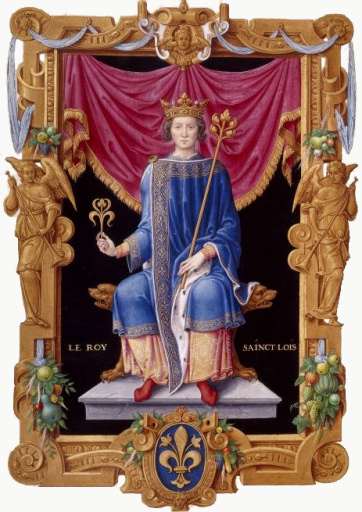Jesteś tutaj: Królewski Paryż » Saint Louis IX — King of France
Saint Louis IX — King of France
Vive Louis XX! l'Aîné des Capétiens et roi de droit!
 The mother of the incomparable Saint Louis IX of France, Blanche of Castille, told him when he was still a child that she would rather see him dead in a coffin than stained by a single mortal sin. He never forgot her words. Raised to the throne and anointed in the Rheims Cathedral at the age of twelve, while still remaining under his mother’s regency for several years, he made the defense of God’s honor the aim of his life.
The mother of the incomparable Saint Louis IX of France, Blanche of Castille, told him when he was still a child that she would rather see him dead in a coffin than stained by a single mortal sin. He never forgot her words. Raised to the throne and anointed in the Rheims Cathedral at the age of twelve, while still remaining under his mother’s regency for several years, he made the defense of God’s honor the aim of his life.
Before one year of their mutual sovereignty had ended, the Catholic armies of France, by a particular blessing, had crushed the Albigensians of the south who had risen up under a heretical prince, and forced them by stringent penalties to respect the Catholic faith. Amid the cares of government, the young prince daily recited the Divine Office and heard two Masses. The most glorious churches in France are still memorials to his piety, among them the beautiful Sainte Chapelle of Notre Dame Cathedral in Paris, where the Crown of Thorns, the great relic which he brought back from the Holy Land, is enshrined. When his courtiers remonstrated with Louis for his law that blasphemers must be branded on the lips, he replied, “I would willingly have my own lips branded if I could thereby root out blasphemy from my kingdom.” A fearless protector of the weak and the oppressed, a monarch whose justice was universally recognized, he was chosen to arbitrate in all the great feuds of his age.
In 1248, to rescue the land where Christ had walked, he gathered round him the chivalry of France, and embarked for the East. He visited the holy places; approaching Nazareth he dismounted, knelt down to pray, then entered on foot. He visited the Holy House of Nazareth and on its wall a fresco was afterwards painted, still visible when the House was translated to Loreto, depicting him offering his manacles to the Mother of God. Wherever he was: at home with his many children, facing the infidel armies, in victory or in defeat, on a bed of sickness or as a captive in chains, King Louis showed himself ever the same — the first, the best, and the bravest of Christian knights.
When he was a captive at Damietta, an Emir rushed into his tent brandishing a dagger red with the blood of the Sultan, and threatened to stab him also unless he would make him a knight. Louis calmly replied that no unbeliever could perform the duties of a Christian knight. In the same captivity he was offered his liberty on terms lawful in themselves, but enforced by an oath which implied a blasphemy, and although the infidels held their swords’ points at his throat and threatened a massacre of the Christians, Louis inflexibly refused.
The death of his mother recalled him to France in 1252; but when order was re-established he again set out for a second crusade. In August of 1270 his army landed at Tunis, won a victory over the enemy, then was laid low by a malignant fever. Saint Louis was one of the victims. He received the Viaticum kneeling by his camp bed, and gave up his life with the same joy in which he had given all else for the honor of God.
Reflection: Saint Louis wrote to his oldest son Philip, heir to the crown: “I recommend to you before all else to apply yourself with all your heart to love God.”
Source: Little Pictorial Lives of the Saints, a compilation based on Butler’s Lives of the Saints and other sources by John Gilmary Shea (Benziger Brothers: New York, 1894).

